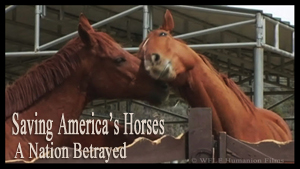- Home
- Sponsorship
- Synopsis
- How to Help
- Thanks
- Blog
- Donate
- About Us
- Take Part
- Accolades
- Tools
- Initiative
- Press
- Contact
SAVING AMERICA'S HORSES - A United Voice for the Horses and Burros- |
|---|
HISTORY - Protective Legislation for Equines (Scroll down for Info on Bills) |
During the 109th Congress, the House of Representatives considered legislation to ban the slaughter of horses for human consumption and to stop the exportation of horses for slaughter elsewhere. With numerous sponsors, HR 503 passed the House overwhelmingly just to be squelched once it reached the Senate. In 2006 Congress put language in an Agriculture Appropriations Bill that cut off funding for horse meat inspections as a short term fix, until a federal ban could be passed. The USDA then attempted to get horse slaughter plants to fund their own inspections, but the U.S. District Court ruled that it’s ILLEGAL for horse slaughter plants to pay the USDA for their own health inspections. This effectively shut down horse slaughter in the U.S. Pro slaughter lobbyists have mounted vigorous opposition insisting that animals constitute private property and that banning slaughter is an unconstitutional restraint of trade. But a three-judge panel on the U.S. Court of Appeals ruled that banning horse slaughter for human consumption IS constitutional. The original sponsors of HR 503 reintroduced amended bills in the 110th and 111th congress, known as The Prevention of Equine Cruelty Act. But select politicians and lobbyists have effectively been able to block the passage of these bills. Proponents continue to push to reopen horse slaughter plants in the U.S. under the influence of deep pocket foreign interests. Unable to slaughter horses in the U.S., the industry opened new slaughter plants in Canada and Mexico, where our American horses have continuously been exported for slaughter to this day.
|
| 117th Congress (2021-2022) |
Safeguard American Food Exports (SAFE) Act of 2021 The Safeguard American Food Exports (SAFE) Act (H.R. 3355) was re-introduced in the House on May 19, by Rep. Jan Schakowsky (D-IL9) and Vern Buchanan (R-FL). The bill would in effect prohibit the slaughter of horses in the U.S. and the export of horses for slaughter. This bill cites health concerns as the primary rationale to prohibit the sale or export of horses or horsemeat for human consumption, because they are frequently treated with drugs that pose a serious threat to human health if eaten. |
| 116th Congress (2019-2020) |
Safeguard American Food Exports (SAFE) Act of 2019 The Safeguard American Food Exports (SAFE) Act (H.R. 961) was introduced by Representatives Jan Schakowsky (D-IL) and Vern Buchanan (R-FL), on Feb. 19th. The bill would in effect prohibit the slaughter of horses in the U.S. and the export of horses for slaughter. The language of the bill states that equines, raised in the United States largely for recreational use, are regularly treated with medications not approved for use in animals intended for human consumption, and that the meat of such animals is therefore unsafe and poses a threat to human health. |
| 115th Congress (2017-2018) |
Safeguard American Food Exports (SAFE) Act of 2017, SB 1214 The Safeguard American Food Exports (SAFE) Act was announced on Friday, Aug 4, 2017 by US Senators Bob Menendez (D-N.J.), Lindsey Graham (R-S.C.), Sheldon Whitehouse (D-R.I.), and Susan Collins (R-Maine). |
| 114th Congress (2015-2016) |
Safeguard American Food Exports (SAFE) Act of 2015, SB 1214 |
A bill to prevent human health threats posed by the consumption of equines raised in the United States Original Sponsor: Introduced: 5/6/2015 Read twice and referred to the Committee on Health, Education, Labor, and Pensions. (5/6/2015)
|
Safeguard American Food Exports (SAFE) Actof 2015, HB 1942 |
A bill to prevent human health threats posed by the consumption of equines raised in the United States Original Sponsor: Sponsor: Rep. Guinta, Frank C. [R-NH-1]
|
| Older Legislative Bills |
The Safeguard American Food Exports (SAFE) Act of 2013, SB 541 |
A bill to amend the Horse Protection Act to prohibit the shipping, transporting, moving, delivering, receiving, possessing, purchasing, selling, or donation of horses and other equines to be slaughtered for human consumption, and for other purposes. Original Sponsor: This bill failed to be passed during the two-year Congress in which it was introduced.
|
The Safeguard American Food Exports (SAFE) Act of 2013, HB 1094 |
A bill to prohibit horse slaughter operations in the U.S., end the current export and slaughter of more America’s wild and domestic equines, and protect the public from consuming toxic horsemeat. Original Sponsor: This bill failed to be passed during the two-year Congress in which it was introduced. |
The Horse Transportation Safety Act of 2013, S. 1459 |
A to amend title 49, United States Code, to prohibit the transportation of horses in interstate transportation in a motor vehicle containing 2 or more levels stacked on top of one another. Original Sponsor: This bill failed to be passed during the two-year Congress in which it was introduced. |
American Horse Slaughter Prevention Act of 2011, SB 1176 |
A bill to amend the Horse Protection Act to prohibit the shipping, transporting, moving, delivering, receiving, possessing, purchasing, selling, or donation of horses and other equines to be slaughtered for human consumption, and for other purposes. Original Sponsor: This bill failed to be passed during the two-year Congress in which it was introduced. |
The House version of the American Horse Slaughter Prevention Act is known as H.R. 2966 |
The American Horse Slaughter Prevention Act will amend the Horse Protection Act to prohibit the shipping, transporting, moving, delivering, receiving, possessing, purchasing, selling, or donation of horses and other equines to be slaughtered for human consumption, and for other purposes. Original Sponsor: This bill failed to be passed during the two-year Congress in which it was introduced. |
The Horse Transportation Safety Act of 2011, SB 1281 |
|---|
The Horse Transportation Safety Act of 2011, SB 1281, is a strong bipartisan bill sponsored by Senator Mark Steven Kirk (R-IL) and Senator Frank Lautenberg (D-NJ), amends title 49, United States Code, to prohibit the transportation of horses in interstate commerce in a motor vehicle containing 2 or more levels stacked on top of one another. Original Sponsor: This bill failed to be passed during the two-year Congress in which it was introduced. |
Interstate Horseracing Improvement Act of 2011, SB 886 |
To amend the Interstate Horseracing Act of 1978 to prohibit the use of performance-enhancing drugs in horseracing, and for other purposes. This bill failed to be passed during the two-year Congress in which it was introduced. |
Interstate Horseracing Improvement Act of 2011, HR 1733 |
To amend the Interstate Horseracing Act of 1978 to prohibit the use of performance-enhancing drugs in horseracing, and for other purposes. This bill failed to be passed during the two-year Congress in which it was introduced. |
H.R. 1018 : Amends the Wild Free-Roaming Horses and Burros Act to improve the management and long-term health of wild free-roaming horses and burros (111th Congress) |
H.R. 1018, the Restoring Our American Mustangs Act or R.O.A.M., would have restored protections for wild horses and burros lost in 2004 under the Wild Free Roaming Horses and Burros Act of 1971. This bill would have also improved the tracking and health of thousands of wild horses and burros. This bill was introduced in the 111th Congress, but was not passed. A new bill has not yet introduced. |
If horses aren’t slaughtered, where will all the unwanted horses go? In consideration of the 9 million horses that exist in the U.S., an average of less than 50k per year are sent to slaughter. This tiny fraction of the horse population can easily be reabsorbed back into the equine community just as it has in the past when the market for horsemeat dropped. The annual number of horses slaughtered in the US dropped from over 300,000 in the 1990s to less than 50,000 in 2003, with no special infrastructure needed to absorb the thousands of “unwanted” horses that were not slaughtered. Horses are being kept longer, sold to others, humanely euthanized, or donated to retirement and rescue facilities. The “surplus horse population” is a myth. Horse slaughter is driven by a demand for horse meat. Typically, kill buyers buy horses at auction for slaughter. The kill buyers are not looking for the unwanted or abused or neglected horses. They are looking for healthy horses that can be slaughtered for horsemeat, a delicacy in parts of Europe and Asia. The USDA has said over 92% of American horses slaughtered are healthy. The "need for slaughter to curb the number of abused, neglected and abandoned horses" is also a myth. |
About USDA FSIS Inspections US Code Section 610(c) under Chapter 12 of the Meat Inspection Act prohibits the commercial slaughter of equines for human consumption, including the interstate sale, transport and other transactions in commerce without Federal inspection. The Federal Meat Inspection Act requires that horsemeat which is sold commercially to be inspected. These agricultural products when shipped or received in interstate commerce are subject to mandatory Federal inspections. The defunding language cuts the funding of USDA FSIS inspections of horse slaughter and this in turn prohibits interstate commerce and conveyance of horsemeat for human consumption. |
Get active locally to inform your community. Many horse owners are still not aware of the truth about slaughter. |
© 2009 - 2022 WFLF Humanion Films All Rights Reserved |
|---|


